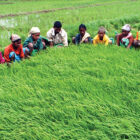Pesticides
As usual, I am awake, while it’s dark outside. Soon the birds begin chirping, one can identify pigeons, magpie robins, parrots, tailorbirds, crows, babblers and partridges. Their chirping ushers in the dawn. I step out, the sky is brighter, and the air is fresh. Blissful it seems, till I look down to find a dead bee on the floor and then there are more and some more. I flinch for a moment. Deep down, I would have hoped otherwise, but I half expected it. It always happens after we spray Profenofos, an organophosphate insecticide. When every measure to stop the pests fails, it’s the extremely toxic weapon of last resort. It also affects brain development in humans, particularly children.













